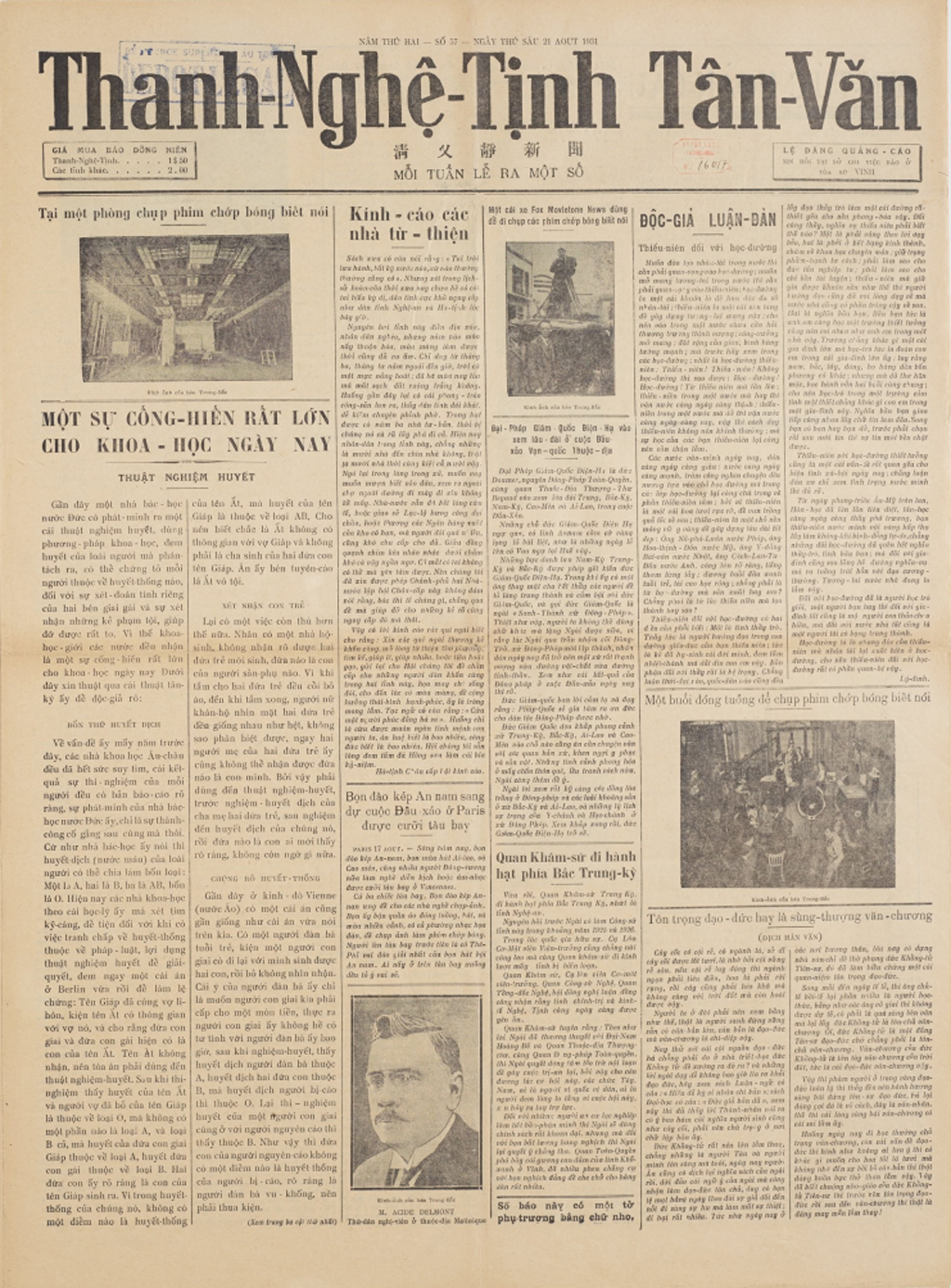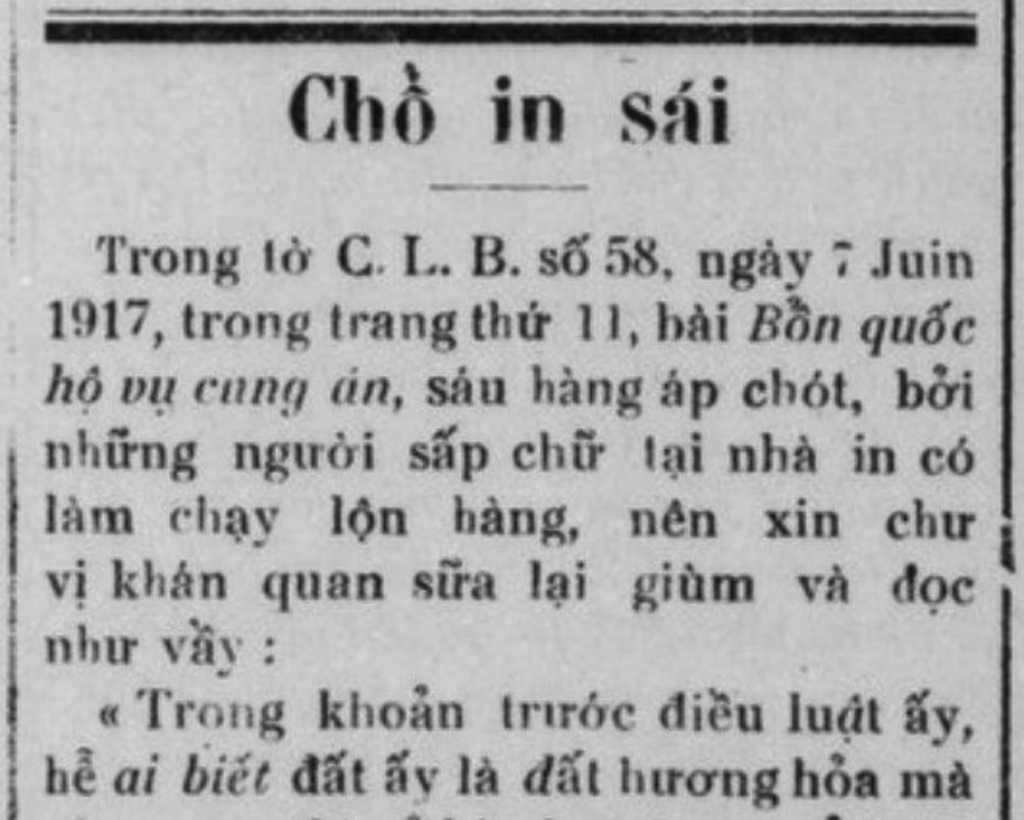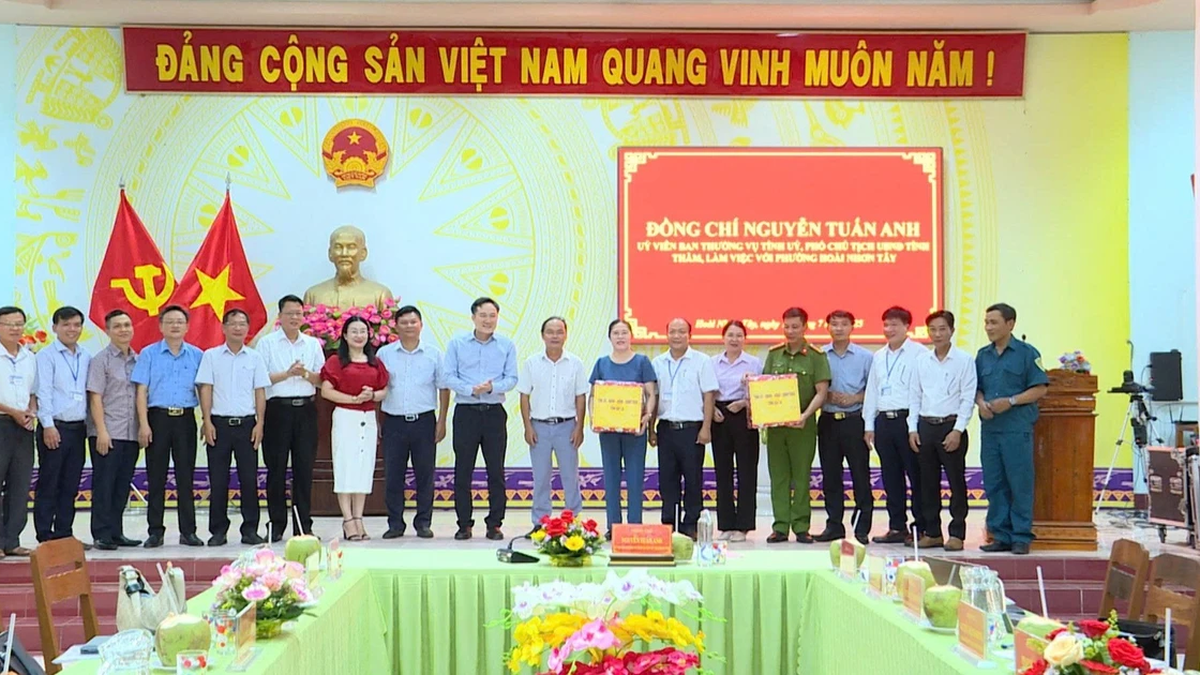When "Thai Phien" became "Thai Mieu"
In the field of journalism, newspapers in the North are closer to being precise in terms of spelling. Punctuation is mostly controlled to avoid errors. Looking through Ha Thanh Ngo Bao, Ha Noi Bao, Bac Ky The Thao ... we can see this problem to some extent. However, newspapers and magazines are not always "correct". Therefore, Phong Hoa newspaper has a section called "Cleaned beans" and Ngay Nay newspaper has a section called "Sand grains" to "clean up" the newspapers' errors. The newspapers themselves sometimes have to correct errors.

Thanh Nghe Tinh Tan Van Newspaper No. 57, published on August 21, 1931, a newspaper with neat spelling.
DOCUMENTS OF DINH BA
In Central Vietnam, there was a newspaper that was very good in terms of spelling, that was Thanh Nghe Tinh Tan Van. Although this newspaper used dialects, it controlled spelling very well, especially in terms of punctuation. Meanwhile, some newspapers in this region still had errors, such as Duong newspaper, which had its editorial office in Vinh, but the place name Cua Lo was printed as "Cua Lo" (issue 13, published on August 1, 1936, p.7); in Hue , Anh Sang newspaper issue 39, published on September 14, 1935 had to "Correct" the previous issue because of many typographical errors, Thai Phien became Thai Mieu, khi thuong became khi truoc, men rau became men ve...
Newspapers in the South before 1945 mostly had spelling mistakes. Perhaps because speaking and writing were not given much attention, this issue was not given much attention. As in an excerpt from Saigon Daily News No. 60, published on February 2, 1931: "The appearance of the newspaper is really beautiful, the pictures are clear, the words are good, the newspaper is skillfully arranged, and even the articles are carefully selected and very sturdy"; or the passage "when spring is almost over, summer is over, the weather is dry, the fields and farms are full of joy, because the harvest is over. The south wind blows cool, the plants and trees grow well, the trees bud in season, there are seasons to bloom, the seasons are joyful, the plants and trees are happy, the season of rest [rest] makes people leisurely; therefore..." in the article Lac tai ky trung in Nong co min dam issue 32, published on April 3, 1902, full of typos as just quoted.
Also because of spelling and wording errors, sometimes the newspaper had to make corrections and corrections in the following issue. "The place where it was printed incorrectly" is the title of the correction in Cong Luan Bao No. 59, published on June 14, 1917: "In the CLB No. 58, June 7, 1917, on page 11, the article Bon Quoc Ho Vu Cung An , the penultimate six lines, because the people who arranged the types at the printing house made a mistake in the lines, so I would like to ask the readers to correct [them] and read as follows: "In the previous paragraph of that law, whoever knows that the land is ancestral land and still buys it, will [be] punished according to [each] time [of] being [also] considered a criminal" (The next three lines are omitted, because the typesetters made a mistake up to [the place of] one dot.)". With the Luc Tinh Tan Van newspaper, the newspaper's correction is named "The Wrong Place", such as Luc Tinh Tan Van No. 521, published on February 28, 1918, recorded on page 4; No. 608, published on March 20, 1919, shown on page 3.

News item "Wrong printing place" in Cong Luan Newspaper No. 59
Neatly edited the Living newspaper
Among many weekly and daily newspapers with spelling errors, Thanh Nien weekly newspaper in the early 1940s was one of the newspapers with the fewest spelling errors among the newspapers in the South. When Bang Giang studied it, he praised it in his work Fragments of Literature History , saying that it was "a weekly newspaper with the fewest spelling errors at that time in the South".
Still in the South, the newspaper Song with its first issue dated January 22, 1935 was also commendable for its good control of this issue, as commented by Nguyen Ngu I in Encyclopedia of the Times No. 25 (217), published on January 15, 1966: "Seeing that the format of newspapers in the South was inferior to that of newspapers in the North, and that the questions and tenses were too messy, Song took the trouble to present the cover and articles beautifully, paying attention to spelling and especially the questions and tenses. What was later achieved was very difficult. But Song can be proud of itself as the first newspaper in the South to print correct questions and tenses."
The above comment of Nguyen Ngu I is similar to the opinion of Mong Tuyet when talking about the newspaper she worked in the editorial office of the memoir Nui Mong Guong Ho with pride: "At that time, only the newspaper Song paid special attention to spelling and grammar like the newspapers printed in Hanoi ". That is also understandable when knowing that Dong Ho was a very meticulous person in writing poetry, writing for newspapers, and printing books, not only in terms of art and presentation, but also in spelling.
In addition to spelling, there were times when the newspaper mistyped the number, or even forgot to type a new number. That's why there were mistakes like the Telegraph newspaper No. 929 published on March 1, 1938, and No. 930 published on March 2, 1938. The issue published on March 3, 1938 should have been No. 931, but the newspaper kept No. 930. When the newspaper was first published, it had two No. 1 issues. No. 1 was published on May 19, 1939, and No. 1 was published on May 26, 1939. (to be continued)
Source link




















































![[Maritime News] More than 80% of global container shipping capacity is in the hands of MSC and major shipping alliances](https://vphoto.vietnam.vn/thumb/402x226/vietnam/resource/IMAGE/2025/7/16/6b4d586c984b4cbf8c5680352b9eaeb0)













































Comment (0)